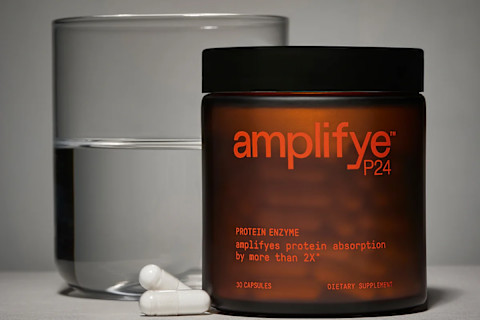How To Get More Protein From Your Diet *Without* Changing How You Eat

As a pescetarian, trying to eat 100+ grams of protein per day felt like a full-time job. My meals were built less around satiety and more around calculation.
I tracked macros, stacked high-protein foods, and forced down 50+ grams of protein for breakfast—only to be left with uncomfortable bloating and fullness.
Instead of trying to eat more protein, I wondered if there was a way to help my body get more out of the food I was already eating.
It turns out I didn’t have to fight my body anymore to get enough protein; I just needed to add amplifyeP24 to my lineup.
Launched last month, this first-of-its-kind enzyme boosts protein digestion of the foods you already eat.* And while it sounds too good to be true, this addition to my routine has transformed the way I fuel my body.
The disconnect between protein eaten and absorbed
Everyone’s preaching about the importance of protein; it plays a role in metabolism, immune function, hormone production, and brain health.
Yet getting enough protein isn’t just about your intake—protein quality matters, too. Scientists measure this using the Protein Digestibility Corrected Amino Acid Score (PDCAAS), which considers both a food’s amino acid profile and how well it’s absorbed.
Some foods, like eggs and cow’s milk, earn stellar PDCAAS scores. But many plant-based staples, like wheat and chickpeas, don’t fare as well.
This discrepancy fueled my desire to eat more protein. I knew my body wasn’t making the most of the plant-based sources that made up half my diet—but it wasn’t the only factor impacting my protein absorption.
What impacts your body’s ability to absorb protein
Protein source
Complete proteins contain all nine essential amino acids your body can’t make on its own; incomplete proteins don’t. Animal proteins tend to be complete, while plant proteins are not. Plus, plant proteins also contain antinutrients, like phytates and lectins, that interfere with absorption.
Gut health
Your body needs to break proteins into amino acids before it can use them. That job falls to digestive enzymes, like trypsin and chymotrypsin. But if stomach acid is low, enzyme function is off, or your gut lining isn’t functioning properly, your ability to digest and absorb protein takes a hit.
Age
We often talk about the importance of increasing protein intake as we age. That’s because we become less responsive to the normal triggers for muscle protein synthesis (MPS) as we age due to anabolic resistance1.
How amplifyeP24 can boost protein absorption*
Until now, the default solution to low protein bioavailability has been simple: eat more. But amplifyeP24 flips the script.
Developed to tackle the disconnect between protein consumed and protein absorbed, amplifyeP24 breaks down protein chains with precision, helping release more amino acids from food.*
In simulation studies, amplifyeP24 more than doubled the bioavailability of salmon, increasing access to amino acids like leucine (for muscle repair), tyrosine (for mental clarity and metabolism), and lysine (for tissue recovery and neurotransmitter support).*
The same effect can be seen on plant protein; amplifyeP24 improved the absorption of soy and pea protein by up to 3x.*
My experience with amplifyeP24
Between counting macros and trying to account for the quality of proteins in my diet, meal times often felt like a math problem rather than a refuel.
Breakfast was the perfect example. Experts often call it the most important meal for protein synthesis, so I’d try to hit 50+ g of protein with a combo of eggs, Greek yogurt, and protein granola. I’d hit my macros—but I’d also start the day uncomfortably full.
That changed when I started using amplifyeP24.* I didn’t suddenly eat less protein, but I no longer felt the pressure to overload every plate. I could trust that my body was absorbing more of what I was already eating.*
I stopped chasing numbers and started listening to how I felt. My body no longer struggled to digest my largest meal of the day, and it led to a boost in my energy levels that helped me thrive through busy mornings.*
While you’re meant to take amplifyeP24 with the largest meal of the day, I’ll often have it with more plant-forward meals. This ensures I’m getting even more nutrients from these less bioavailable sources of protein without doubling my serving size.*
FAQ
Where does amplifyeP24 come from?
Originally discovered in a Japanese hot spring, this enzyme evolved in highly acidic environments. Now the microbes are grown through a fermentation process, which takes about 24 hours. amplifyeP24’s enzymes are then carefully extracted from the microbial mixture and dried into a powder—making it vegan, GMO-free, and gluten-free.
The takeaway
Done with stressing over your protein intake? amplifyeP24 helps you get more from every bite.* By boosting protein bioavailability 2–3x, it makes it easier to unlock sustained energy, sharper focus, and faster recovery—without eating more.*
*These statements have not been evaluated by the Food and Drug Administration. This product is not intended to diagnose, treat, cure or prevent any disease.

